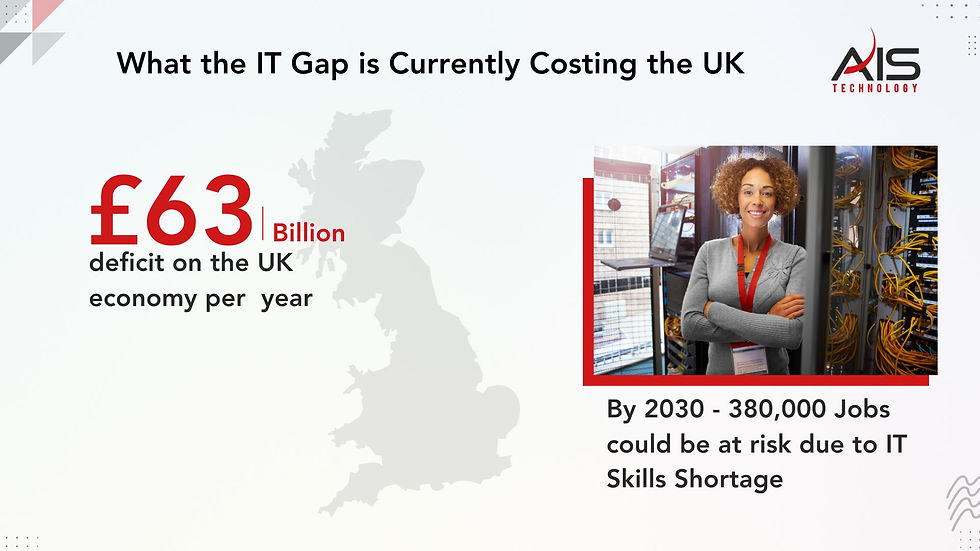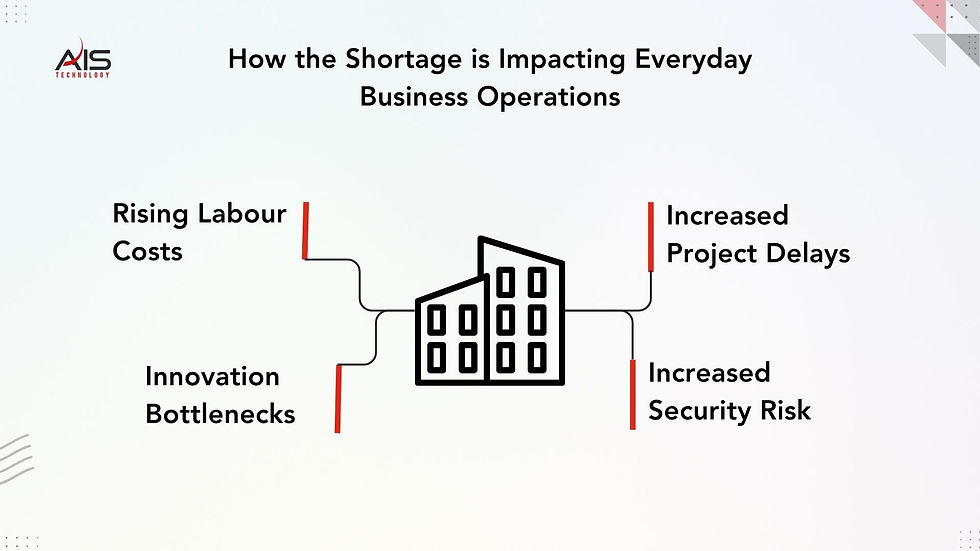Business IT Support in a Time of Crisis: How MSPs Are Closing the UK IT Skills Gap
- AIS Technology

- Jul 24, 2025
- 6 min read

The UK is experiencing a severe shortage of IT talent, a crisis that has deep implications for businesses across every sector. As of 2025, this shortfall is no longer a problem isolated to technology firms. It is now a national concern with real economic consequences.
Small to mid-sized businesses, in particular, are feeling the pinch. Recruitment is harder. Projects are delayed. Security vulnerabilities go unaddressed. Meanwhile, competition for skilled talent is driving up wages, pricing out firms without deep pockets.
But amid this growing challenge, one solution is proving essential: managed service providers (MSPs). These companies are helping businesses plug skill gaps, ensure resilience, and deliver strategic, long-term business IT support.
Understanding the UK IT Skills Shortage
The UK digital economy is growing, but not fast enough to keep up with demand. Employers are scrambling to hire people with the right tech skills, and the talent simply isn’t there.

The Most In-Demand Tech Skills
The hardest roles to recruit for in 2025 include:
Artificial Intelligence and Machine Learning engineers
Cybersecurity analysts
Data analysts and scientists
Cloud engineers
DevOps engineers
Full-stack developers
Blockchain engineers
UX/UI designers
Product managers
Network and systems administrators [1]
These positions are crucial to digital transformation initiatives. Without them, organisations cannot modernise infrastructure, automate processes, or protect sensitive data effectively.
Economic Costs and Workforce Challenges
The economic consequences are enormous. The UK’s digital skills gap is currently estimated to cost the economy £63 billion per year [2]. Looking ahead, that figure could rise by another £27.6 billion by 2030, placing 380,000 jobs at risk if the skills gap remains unaddressed [3].

More worryingly, the challenge isn’t just about hiring new talent. There’s a systemic issue around digital competency across the existing workforce:
Only 23% of UK employees have received any formal digital training from their employer [4].
60% of the workforce cannot perform all essential digital tasks required in the modern workplace [5].
18% of UK adults lack even basic digital skills, such as using spreadsheets, navigating cloud platforms, or setting up secure passwords [5].
This widespread skills deficit is stalling productivity and threatening competitiveness, not just in tech, but across manufacturing, healthcare, finance, retail, and beyond.
Regional Imbalances and SME Impact
While the demand for IT professionals is highest in London, the South East and Essex areas, the shortage is felt nationally. In regions like the East of England, Midlands, and the North West, the skills gap is even more pronounced, limiting innovation and deterring investment [6].
Small and medium-sized enterprises (SMEs) are disproportionately affected. Without the brand appeal or financial leverage of large tech firms, they struggle to compete for talent, leading to operational risk and missed opportunities for growth [7].
What This Means for Business IT Support
This shortage is redefining how companies think about IT support. In years past, business IT support might have been focused on reactive fixes, ad hoc consultancy, or limited infrastructure services. But today, strategic IT support is critical to long-term success.
Here’s how the shortage is impacting everyday business operations:

Increased Project Delays
UK organisations now experience average project delays of 3.8 months due to a lack of available technical expertise. The cost? Around £107,000 per project in lost time, missed opportunity, and overtime expenses [8].
Rising Labour Costs
The scarcity of IT professionals has led to a bidding war, particularly in areas like cloud, AI, and cybersecurity. Median IT salaries in the UK rose by 7.6% in 2024 and continue to trend upwards in 2025, according to recent recruitment market data [9].
Increased Security Risk
With cybersecurity one of the most in-demand skills, the shortage directly increases organisational risk. Without the right expertise in-house, vulnerabilities go unnoticed, patches are delayed, and incident response is weakened [10].
Innovation Bottlenecks
Digital innovation relies on skilled people. Without them, businesses cannot migrate to the cloud, automate their workflows, adopt AI tools, or implement modern cybersecurity frameworks. The result? A widening competitive gap between those who can recruit and those who cannot.
MSPs as a Strategic Response
Managed Service Providers (MSPs) offer a practical, scalable solution to the skills crisis. By outsourcing key IT functions, businesses gain access to specialist skills without the challenges of recruitment, onboarding, or long-term employment costs.

Skill Access on Demand
MSPs maintain in-house teams of certified engineers, analysts, and specialists across multiple domains cloud, security, networking, infrastructure, software deployment, and more.
This means SMEs can instantly access high-level expertise without needing to hire full-time cloud architects or cybersecurity experts [11].
Predictable, Scalable Support
Rather than fluctuating costs associated with in-house hires, MSPs offer fixed-fee models that are easier to budget for. Businesses can also scale support up or down as their needs evolve.
This agility is crucial for businesses undergoing growth, transformation, or merger and acquisition activity [12].
Proactive Monitoring and Security
Modern MSPs don’t just respond to tickets they proactively monitor systems, implement patching schedules, and manage updates.
This reduces downtime, boosts performance, and improves cybersecurity posture through early detection and remediation [13].
Tools and Automation at SME Scale
Access to enterprise-grade tools like endpoint detection and response (EDR), cloud orchestration platforms, or AI monitoring systems is now available to smaller businesses through their MSP relationships.
This democratises digital maturity, allowing SMEs to remain competitive despite resource constraints [14].
The Bigger Picture – Growth in the MSP Sector
The growing reliance on MSPs reflects broader market trends. According to government research:
The UK is home to over 11,400 managed service providers.
These firms generate approximately £52.6 billion annually in managed services revenue.
The MSP sector employs over 294,000 full-time professionals nationwide [15].

This makes the UK MSP ecosystem a vital component of the digital economy. MSPs aren’t just service providers, they’re enablers of innovation and long-term business continuity.
Furthermore, MSPs are evolving. Many are embracing:
AI-powered service desks
Managed detection and response (MDR) solutions
Cloud-native backup and disaster recovery tools
Infrastructure-as-Code (IaC) and DevOps automation
These innovations are helping businesses close the skills gap, adapt to changing customer demands, and implement sustainable IT strategies.
AIS Technology – The Right MSP Partner for Business IT Support
For SMEs across Essex and the South East, AIS Technology offers a practical, local solution to the national IT skills shortage. Our services are designed to deliver strategic value, not just reactive support.

Here’s what sets AIS apart:
Local Presence, Nationwide Reach
Our engineers and support teams are based in Essex, with reach across Greater London and the South East. This gives our clients responsive service with on-the-ground support when needed.
Full-Service Business IT Support
From helpdesk services and endpoint security to Microsoft 365 management and cloud infrastructure, we offer end-to-end coverage.
Cybersecurity by Design
We don’t treat security as an add-on. It’s built into every managed support plan—alongside backup, continuity, and compliance services.
Cost-Effective, Scalable Plans
Our fixed monthly pricing makes budgeting simple and enables SMEs to scale without surprises.
Strategic Advice and Partnership
As a trusted MSP, we provide strategic IT consulting to help you plan long-term roadmaps, assess risk, and align technology to your business goals.
Whether you’re managing a hybrid workforce, migrating to the cloud, or improving your cybersecurity posture, AIS helps your business thrive despite the skills shortage.
Final Thoughts – Business Resilience in Uncertain Times
The UK’s IT skills shortage is not going away anytime soon. For businesses trying to grow, modernise, or simply operate efficiently, the shortage presents a real threat to competitiveness and resilience.
But there is a path forward.
By partnering with a proactive, experienced MSP like AIS Technology, SMEs can:
Access high-level expertise instantly
Secure their systems and data
Reduce costs and complexity
Focus internal teams on value-added work
Plan confidently for the future
Business IT support is no longer just a technical requirement, it’s a strategic imperative. Let AIS help you meet that challenge head-on.
References
TechUK, The Economic Cost of the UK’s Digital Skills Gap, 2024.
University of Birmingham, 380,000 Jobs at Risk from Skills Deficit, 2025.
Experis UK, 2025 Talent Report.
Lloyds Bank UK Digital Index, 2024.
Institute for the Future of Work, Regional Digital Disparities Report, 2024.
Computer Weekly, How UK SMEs Are Responding to the Skills Shortage, 2025.
ITPro, Project Delays Caused by Skills Shortages, 2025.
Hays Salary & Recruiting Trends Guide UK 2025.
National Cyber Security Centre (NCSC), UK Cyber Threat Landscape, 2024.
AZTech IT, Benefits of Managed IT Services, 2024.
Serveline, Why MSPs Make Sense for Growing Businesses, 2024.
Blue Saffron, How MSPs Deliver Proactive Support, 2024.
JumpCloud, MSP Adoption Trends Report, 2024.
Gov.uk, Research on UK Managed Service Providers, 2024.




Comments